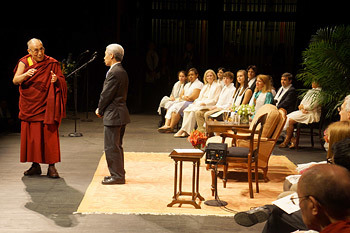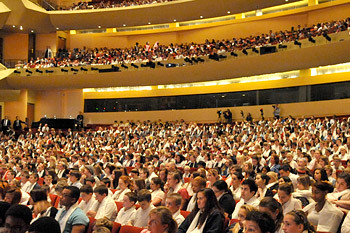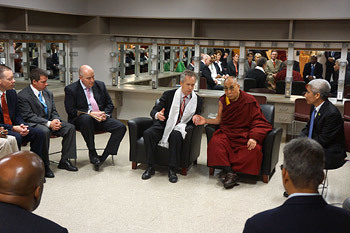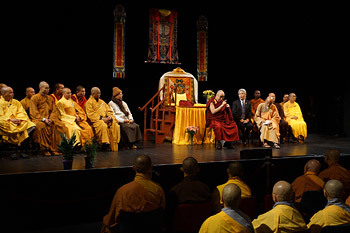Louisville, KY, USA, 21 May 2103 - His Holiness the Dalai Lama’s first meeting on his last day in Louisville was with a group of gentle Vietnamese Buddhists.
“Let’s begin with your reciting the Heart Sutra in Vietnamese,” he said. “While you do that visualize the Buddha in the space in front of you surrounded by Indian teachers like Nagarjuna and Asanga, and those who brought Buddhism to Vietnam. And remember how the Buddha practised for aeons to show us that through a combination of the awakening mind of bodhichitta and the wisdom understanding emptiness, we too can attain enlightenment.
“In the Sanskrit tradition of Buddhism it is explained that all sentient beings have Buddha nature, the potential to become a Buddha, and we extend our compassion to all of them.”
His Holiness clarified that it is a feature of the Buddha’s teachings that they appear to be inconsistent because he taught according to the dispositions of his listeners at different times and places. He suggested that it is possible to view other religious traditions as similarly suited to the needs of particular people, times and places and therefore deserving of our respect.
He mentioned meeting groups of Vietnamese in other parts of the world and that he is impressed by the way they keep up their language, Buddhist traditions and monastic robes. He remarked that Tibetans too are trying to preserve their culture and religion in the face of adversity. A question was asked about how His Holiness imagines freedom coming about in Tibet and he replied that although they don’t seek outright independence, Tibetans have their own language and culture, as well as a fragile environment, to protect, something best done by Tibetans themselves. And for that they need genuine autonomy.
Elsewhere in the Kentucky Center, His Holiness next met with middle and high school students from the Louisville area. He began by noting that some people are under the misapprehension that love and compassion are values that belong to religion, whereas he believes they are a natural part of human life, with a biological source. He pointed out that we are all born from our mothers and we have to depend on others to survive. He conceded that there are cases of children being neglected or abused which leads to their insecurity and unhappiness later in life.

|
His Holiness the Dalai Lama speaking to a group of middle and high school students at the Kentucky Center for Arts in Louisville, Kentucky on May 21, 2013. Photo/Jeremy Russell/OHHDL
|
“Not only should we not think that human values are confined to religious practice, it would be a mistake to think that compassion only benefits other people, but brings us no reward. My mother was consistently kind and compassionate to others, despite being illiterate and uneducated, and she was also consistently happy. Later, when I came to engage in Buddhist training in compassion, I found it easier because of the seeds of compassion my mother had sown in me.”
His Holiness affirmed that as far as he is concerned all 7 billion human beings are like brothers and sisters. He said that when he meets someone he thinks, “Here’s another human being.” A person who practises compassion and forgiveness has great inner strength, whereas aggression is usually a sign of weakness. Similarly, when two people have an argument, it tends to be the one who has reason on her side who is less inclined to become angry. We can reinforce our sense of compassion by using our intelligence.
“If someone behaves negatively towards you, it can be very helpful to remember that they are human beings like you. It’s also helpful to remember to distinguish between an action and the person who does it. If you need to take counter measures to prevent someone doing harm, it is always better to do it with a calm rather than an agitated mind. If we act out of anger, the best part of our brain fails to function properly. Remember, compassion is not a sign of weakness.”
The students had prepared questions and the first asked looking back what advice he would give his 13 year old self, while a second wondered what he enjoys doing that might surprise some people. His Holiness replied:
“I have some regret that at an age that was an ideal time to study I played instead. That time is gone and I regret losing it. When I was younger I loved gardening. I also used to love toys that moved. I’d play with them for a while and then would open them up to see how they worked. In a similar spirit, I looked at the moon through my telescope and seeing the shadows of the mountains realised they were caused by sunlight and that the moon had no light of its own. This was the beginning of my interest in science, which I have encouraged Tibetans to share. Last year, our Tibetan monasteries in India formally decided to incorporate science into their study programs.”

|
Some of the over 2,500 middle and high school students , wearing ceremonial Tibetan scarves as a offering to His Holiness the Dalai Lama, at the Kentucky Center for Arts in Louisville, Kentucky on May 21, 2013. Photo/Jeremy Russell/OHHDL
|
Asked what techniques American youth might adopt to calm down and avoid anger, His Holiness said that what they need to do is tackle their disturbing emotions, adding that if their basic mental state is calm it’s easier to deal with eruptions of anger. He recommended that corresponding to physical hygiene we should encourage the adoption of mental or emotional hygiene. When we have a calm mind we have less fear, anger and suspicion. One way to achieve this is to pay attention to our breath, by mindfully counting 20 inhalations and exhalations. That will reduce our tendency to anger.
To a question about how to deal with prevailing violence, His Holiness observed that this is not only a problem here but in many other places. He said it is another symptom of our need to reintroduce a sense of human values, which he likes to refer to as secular ethics, into our modern education system.
Another student wanted to know if His Holiness has any sense of fear and he recounted being bitten by a dog and then being told that it was a mad dog. He also mentioned visiting the sites of the Holocaust concentration camps in Poland, seeing the ovens and shower blocks and having a strong sense of fear there. This was similar to his response to the two places in Japan, Hiroshima and Nagasaki, where nuclear weapons were used.
“On the other hand, the news that CO2 emissions have now passed the dangerous threshold of 400ppm is cause for another kind of fear.”
Students and teachers expressed their gratitude to His Holiness for coming, one of them telling him, “You remind us of the goodness within us.”

|
| His Holiness the Dalai Lama meeting with Louisville Mayor Gary Fischer and his team at the Kentucky Center for Arts in Louisville, Kentucky on May 21, 2013. Photo/Jeremy Russell/OHHDL |
Meeting with Mayor Gary Fischer and his team, His Holiness stressed that whatever you do it is your motivation that is really important. He commended him for his initiatives towards compassion for the city and suggested that under his leadership it should be possible to promote human values under the banner of secular ethics.
Last of all, the organizers and volunteers who had worked hard to make the events in Louisville a success wanted to have a photograph taken with His Holiness. He posed with them, thanked them for all they had done, and, praising the great merit they had created during their work, told them that he always dedicates his merit to the awakening of all sentient beings and recommended they do the same.
Leaving Louisville for Chicago, His Holiness will later today fly across the Atlantic, and with a short stop Europe, travel on to India.
















